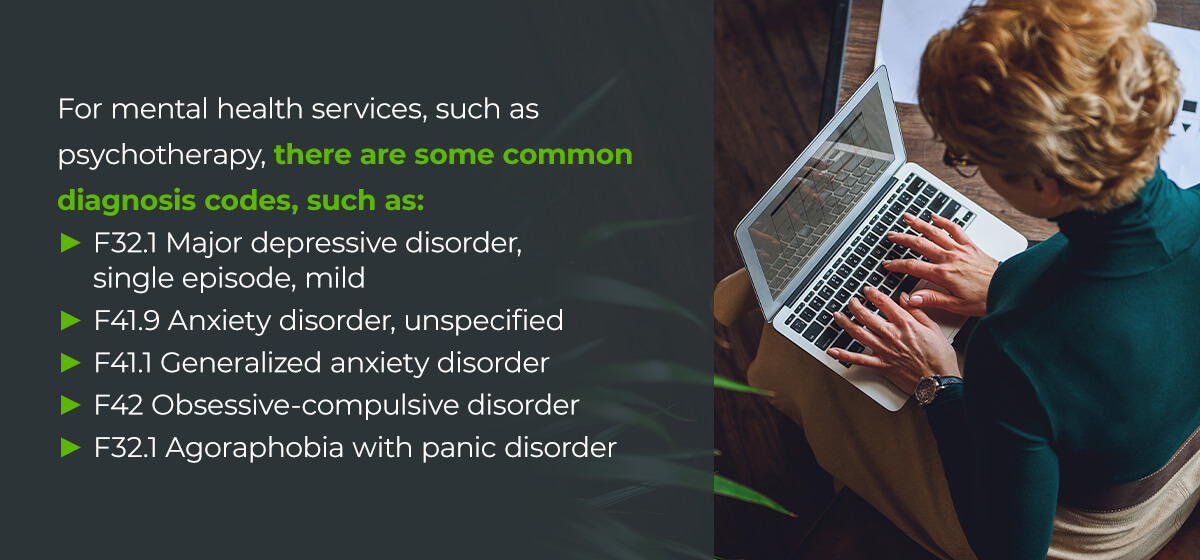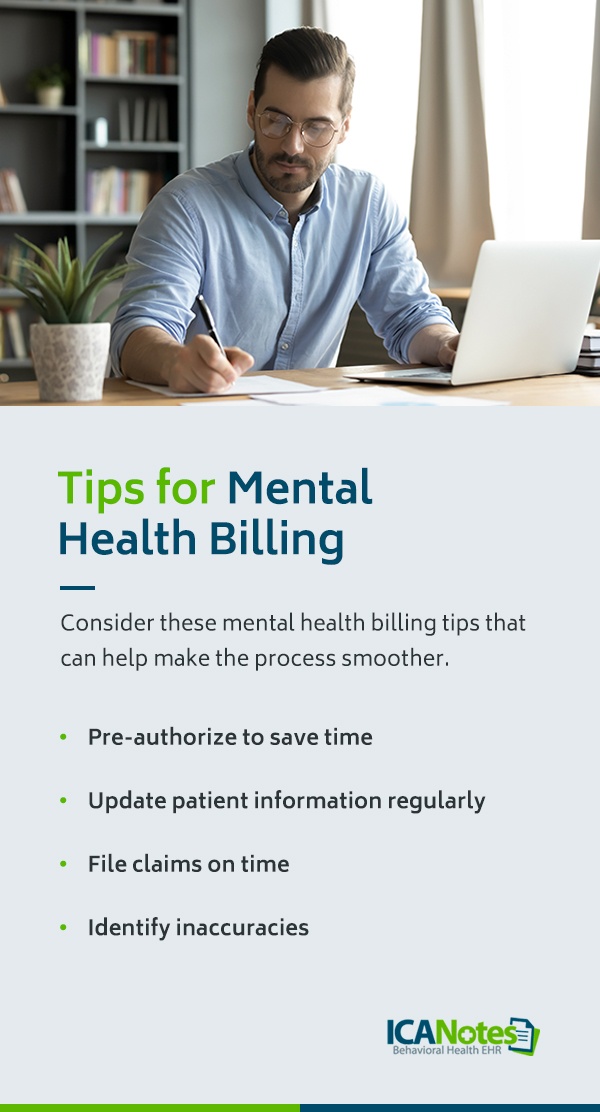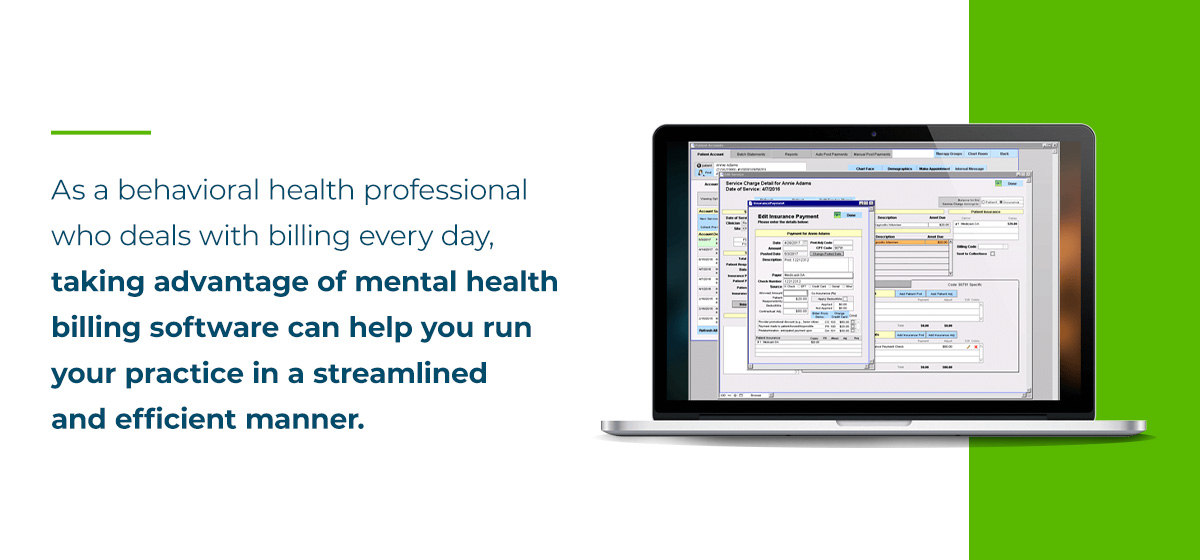Blog > Billing & Insurance > Complete Guide to Mental Health Billing
Complete Guide to Mental Health Billing
Mental health billing is often complex and time-consuming, with coding errors, documentation issues, and insurance hurdles getting in the way of patient care. This guide breaks down everything clinicians need to simplify billing, reduce claim denials, and get paid faster—so they can spend more time helping clients and less time chasing payments.

Last Updated: May 9, 2025


What You'll Learn
- The most common billing pitfalls in mental health practices—and how to avoid them
- How to properly use diagnosis and CPT codes to ensure faster reimbursements
- Step-by-step tips to verify insurance, submit clean claims, and reduce denials
- When and how to outsource billing to save time and improve cash flow
Mental health services are essential for the well-being and emotional healing of so many. These services and treatments span a wide range of clinical settings and therapeutic interventions. However, billing for mental health services can often hinder the treatment process if there are coding errors, inaccurate or inefficient documentation and pre-authorization issues.
One or more of these problems — and many other variables — can make it difficult for mental and behavioral health providers to operate their practice efficiently. A lot of time and energy goes into filing a claim with medical billing for mental health services, taking away time from patients. Learning more about the behavioral health billing process can make it easier for you to spend more time and energy on your patients and less on inconvenient discrepancies. Consider this a crash course on mental health billing for dummies.
Types of Covered Mental Health Services
It's important to know the types of mental health services covered by your patients, who may have varying insurance or medical coverage. For example, some insurance will only cover mental health services by specific providers, such as physicians, psychiatrists, clinical psychologists, and clinical social workers. Additionally, some independent mental healthcare providers can only diagnose the patient with a mental disorder because insurance will not cover the actual treatment.
If you are part of a private practice, then physicians' and psychiatrists' diagnosis and treatment of the mental disorder will most likely be covered by insurance. These services are often some method of counseling, including a general form of:
- Family medical psychotherapy: If a family member has a certain condition, diagnosis or other mental health issues, immediate family members or caregivers receive therapy sessions to learn about their condition and how to take care of them. This service can occur with or without the patient present and is sometimes considered for payment.
- Group psychotherapy: Several patients are chosen as a group to get treated interactively to help change behavior patterns. If their diagnoses are treatable, they should be covered by medical insurance.
- Psychiatric therapeutic services: This is a form of individual therapy with a patient who can communicate and understand interactive questions and treatment from a provider. This therapy can include treating patterns of behavior, emotional disturbances, and examinations.
- Psychiatric diagnostic review: Also known as a psychiatric diagnostic interview examination, this mental health service collects a patient's medical and mental health history. A provider will also have the patient undergo a mental health status exam and evaluate their willingness and ability to respond to treatment.
Download Our Complete
Guide to Mental Health Billing
Simplify behavioral health billing, avoid common coding mistakes, reduce claim denials, and get paid faster with this step-by-step guide—perfect for solo clinicians or billing staff.
The Role of Medical Record Documentation
Private practice billing services must include proper documentation. Everything transpiring between a patient and the mental healthcare provider should be in the medical record. But why is mental health documentation important? A patient's medical record determines what is billed for the mental health service, which means that all required information must be adequately documented. This medical record will help support the diagnosis and procedure code that is billed to insurance.
Essentially, an incomplete or inaccurate medical record would reflect that medical and mental health services are unnecessary for the patient. This error often results in insurance companies not paying for the service, making it difficult for behavioral health providers to do their job and patients to get the treatment they need. Proper note-writing and documentation also play a huge role as a communication tool used between mental health providers and professionals.
When you have accurate, up-to-date medical record documentation, the risk of challenges to treatment and administrative litigation and penalties is reduced. Some of the essential things that need to be documented in these clinical records include:
- Patient's reason for seeking treatment and mental health or medical history
- Past and present diagnoses and test results
- Physical exam, assessment and clinical impression
- Identification of factors that bring a health risk
- Plan of care for the patient
- Level of care justification
- Patient's progress and response to treatment
- Any revisions of the diagnosis
- Date and identity of mental health provider
It's no secret that documentation can be a hassle. You may even think to yourself, "Why do I need to write mental health notes?" Consider all valuable and relevant information insurance companies may need to confirm your reimbursement. In addition, note writing will help you stay more organized with your patient notes if you see a large number of clients regularly.
Diagnosis Coding for Mental Health Billing
Diagnosis coding allows mental health professionals to identify different treatments, diagnoses, or actions given to the patient. Diagnosis coding is documented to make it easier to categorize different mental disorders or diagnostic evaluations during therapy. These codes are essential for the billing process concerning insurance. Insurance companies need to see that the patient has a clear diagnosis that is medically necessary and qualifies for covered mental health insurance.
These codes are also known as ICD codes, or the International Classification of Diseases, which are the required code set for billing purposes. The codes contain criteria for mental health disorders and conditions that are relevant to psychological use. CPT codes also contain E/M codes — Evaluation and Management codes — which are also often used.
ICD codes were set by the World Health Organization (WHO). They can also identify related health problems and are used with CPT codes for billing insurance. ICD codes are listed in The Diagnostic and Statistical Manual of Mental Disorders (Fifth Edition), generally known as the DSM-5, which gives therapists and psychiatrists the correct codes for billing.
For mental health services, such as psychotherapy, there are some common diagnosis codes, such as:
- F32.1 Major depressive disorder, single episode, mild
- F41.9 Anxiety disorder, unspecified
- F41.1 Generalized anxiety disorder
- F41.1 Generalized anxiety disorder
- F42 Obsessive-compulsive disorder
- F32.1 Agoraphobia with panic disorder
The list of codes that mental and behavioral healthcare providers must know is essential for billing purposes and services. For instance, if a psychiatrist or therapist makes an error and documents the wrong code, a patient may not receive proper treatment. In addition, it would be a time-consuming hassle to fix the mistake and ensure that the patient is receiving an accurate, automatic diagnosis code for insurance billing and mental health services.
Why Mental Health Billing Can Be Complicated
There are many different mental health treatments and services with varying restraints that can make medical billing difficult. To break it down, let's compare it to routine checkups at a doctor for your physical health. In this case, most exams are pretty standard and similar. The doctor will usually perform the same exams and tests for many patients, such as checking blood pressure, height, weight, listening to your heart or getting blood samples.
When these services are billed to health insurance, it is often a simple task because routine checkups are frequently under one general charge. For mental and behavioral health services, this is not always the case. There is a wide range of factors that contribute to the differences in these services. The length of a session, the location of services, the therapeutic approach, the age of the patient and their willingness to participate can all affect coding and billing.
This is a reason why mental health billing becomes complicated for providers, as it's challenging to offer standardized treatment for all patients — making billing just as complex. Insurance companies have attempted to standardize billing for mental and behavioral health services to minimize payment in terms of the length of treatment, the number of treatments and the maximum number of covered treatments.
Many health insurance plans also require pre-authorization, which means that patients must get permission before receiving coverage for some mental health services. This procedure can prolong insurance billing and prevent a patient from receiving the treatment they need. Mental healthcare providers can also become frustrated with medical billing because of the lack of resources. Many private practices are small and have limited administrative support to help with the task of medical billing — which can lead to unintentional errors and overworked physicians and therapists.
Tips for Mental Health Billing
When learning how to bill for therapy services, there is always room for improvement and efficiency. Some elements can speed up insurance billing and ensure a reduction in documentation errors — benefitting mental health providers and patients alike. Consider these mental health billing tips that can help make the process smoother.
- Pre-authorize to save time: While pre-authorization is not often necessary for initial or basic mental health sessions, many patients might have health plans that require it for lengthy or multiple-session cases. Always check if pre-authorization is required before working with a new client, especially in a therapy session that is considered non-standard.
- Update patient information regularly: Your patient's insurance coverage should always be up-to-date and accurate, but their personal information is just as important. You should ensure that this is done every year, if not more often. If a patient has a change in address, marital status or any other changes, you should be aware so you can make accurate claims.
- File claims on time: Clients or patients might have submission requirements that require claims to be submitted by a specific date or within a period of time. If you fail to meet this requirement, you won't be paid for the service because your claim will be denied. Consider creating a billing schedule in your practice, such as a specific date every month, to confirm that all claims are submitted on time to the insurance carrier.
- Identify inaccuracies: If you have had claims denied in the past, you know how frustrating and time-consuming it can be. Check the reason for denial provided by your insurance company to see how you can rectify the issue and submit an accurate claim. Looking at your denied insurance claims can also help you identify patterns in your billing process that can be improved. You should also ensure that you fix the issues for the resubmission within the given window of the insurance carrier.
1. Always Double-Check Each Patient's Insurance
As with any mental and behavioral health industry procedure, it doesn't hurt to double-check yourself. If you have had issues with incorrect information in the past, leading to claims issues, it's always best to implement double-checking in your practice. Confirming your patient's insurance is one of these areas where you want to be certain. Otherwise, medical billing will only be more difficult. Before sessions with any new or existing patient, ensure that you know their insurance plan and benefits ahead of time.
If you know the available coverage for every patient before you provide services, it will be much easier for you to submit proper claims and minimize frustration for you and your patient. This may take some additional time on your part, but it will be worthwhile when you can avoid common mistakes. If you want to check your patient's coverage, you can perform a verification of benefits (VOB). This procedure will give you a better idea of your patient's insurance plan and provide them with treatment and services accordingly.
Double-checking patient insurance can also help you identify authorization requirements or any changes in their plan or coverage, as many patients may forget to inform you of changes. Verifying this essential component will also help you learn how to bill insurance companies for counseling accurately. Double-checking can lead to more efficient processes in your practice or clinic.
2. Perform a Verification of Benefits
As mentioned above, the verification of benefits (VOB) is important to confirm a patient's insurance coverage and the service they intend to receive. In this process, you can check your patient's policy for information that won't often be directly on their insurance card. This step is important for making mental health billing easier, because though many patients have active insurance, your services may not be covered as a benefit.
However, regardless of the services you provide, it's always a good idea to check that your patient is covered for the mental health services they need. Performing a VOB can also help you determine the amount that your patient's insurance company will pay for the services they are seeking. To do this, you can call the patient's insurance company provider using their account number to get a better idea of their benefits.
If your practice has an online provider's portal, you can also check there to discover and verify a patient's benefits and eligibility for your services. If these options still somehow leave you with unanswered questions or uncertainty, you can always consider using electronic health record (EHR software to do the VOB for you. While this process is not always simple, quick, or easy, it's essential to know the coverage and benefits that your patient has.
A VOB can help you avoid rejected claims from the insurance company as well as unpaid bills for the services you provide to your patient.
3. Submit Claims Properly
As a mental healthcare provider, you can do everything right up until you submit a claim, but all of your hard work will be undone if you don't do it properly. For instance, after you provide a service, you should expect to receive reimbursement from a claim. However, if you file an incorrect code or accidentally file it to the wrong insurer, you can be denied or run into other billing issues.
When submitting a claim, you must ensure that you do so in the correct billing format based on the insurance company you are filing with. To make this process easier, identify the insurance company's preferred filing method and the window of time they allow for filing claims. You will certainly want to file your claim within that window of time, or you run the risk of a prolonged claims process. To stay ahead of this, you can ask the insurer about their preferences for receiving claim filings when you go through the VOB procedure.
Another tip for submitting claims properly is to familiarize yourself with common claims forms that many insurance companies use, such as the UB-04 form. This form is usually reserved for mental health clinics and specialized health centers for medical billing. The UB-04 and other mental health forms are uploaded on some compliant software programs, making it easier for you to electronically fill out and file the form.
If you follow these guidelines for submitting claims, you can feel confident that your time spent on these processes will be reduced, and feel less intimidated.
4. Understand CPT Codes
Common Procedural Technology (CPT) codes are also necessary for billing for psychiatrists and other mental health providers who can prescribe medications and provide diagnoses. Now that you know how ICD codes are relevant to insurance billing, CPT codes have a similar role. ICD codes are used primarily for diagnosing a patient, whereas CPT codes are used to support the diagnosis with the necessary medical treatment.
CPT codes are an essential part of the billing process because the correct codes enable you to get paid and steer clear of insurance audits. These codes also document the exact service that your patient received, which determines how much you will be paid. It's important to know what services your practice offers and the codes that are associated with them. Like ICD codes, there are some common CPT codes that mental and behavioral health providers use.
CPT codes often describe the length of the session or whether or not the patient or family of the patient were present, such as:
- 90832: Psychotherapy, 30 minutes with the patient
- 90847: Family or couples psychotherapy, with the patient present
- 90853: Group Psychotherapy (other than a family group)
As a behavioral health practitioner, billing can get confusing between ICD and CPT codes. However, using an incorrect CPT code, even as an accident, can have significant implications. There are usually two types of mistakes made when using CPT codes:
- Undercoding: Undercoding is when a CPT code represents a less severe diagnosis or lower-priced treatment than was actually given to a patient. Though this practice is often done intentionally to help save patients money for their services, it is illegal.
- Upcoding: Upcoding, or overcoding, is also illegal and commonly done to receive higher reimbursement. Upcoding is when a provider uses a code that reflects a more severe diagnosis or higher-priced treatment than is accurate for a patient.
Both undercoding and upcoding can easily result from an untrained employee who doesn't have adequate coding knowledge.
It's critical to know the criteria for CPT codes for medical decision-making and to ensure that you and your practice will avoid these costly mistakes.
5. Outsource Mental Health Billing Services
Managing billing in-house can be time-consuming and frustrating, especially for busy behavioral health practices navigating complex payer requirements, denied claims, and shifting regulations. Outsourcing your mental health billing to a trusted partner can help reduce administrative burden, improve claim turnaround times, and increase revenue.
ICANotes offers full-service behavioral health Revenue Cycle Management (RCM) to support your practice every step of the way — from eligibility verification to payment posting. Our dedicated RCM team brings deep expertise in behavioral health billing and works proactively to minimize denials, shorten reimbursement cycles, and maximize collections. Whether you're a solo practitioner or a growing group practice, outsourcing to ICANotes RCM allows you to stay focused on client care while we handle the complexities of your revenue cycle.
How ICANotes Can Help Your Mental Health Billing Process
ICANotes provides two powerful options to streamline and strengthen your behavioral health billing process: an all-in-one EHR with integrated billing tools, and a full-service RCM solution.
If your practice handles billing in-house, the ICANotes platform includes robust billing features designed specifically for behavioral health. You can generate CMS-1500 and UB-04 claims directly from your clinical notes, manage payer rules, track authorizations, and stay on top of claim statuses through seamless integration with clearinghouses. Built-in appointment and eligibility tools help reduce billing errors at the front end, while customizable reports offer insight into reimbursements and financial performance.
Prefer to leave billing to the experts? ICANotes also offers outsourced billing services, giving you access to a team of behavioral health billing professionals who manage claims from submission through payment. We stay current with payer policies, follow up on rejections, and provide detailed reporting, so you have visibility without the hassle. Our RCM services are designed to increase revenue, reduce denials, and save valuable time — all with the support of a team that understands the unique needs of mental health providers. Call us at 443-347-0990 for more information or to schedule an RCM Consult.
Get Your Free 30-Day Trial (no credit card required!)
Related Posts
Dr. October Boyles is a behavioral health expert and clinical leader with extensive expertise in nursing, compliance, and healthcare operations. With a Doctor of Nursing Practice (DNP) from Aspen University and advanced degrees in nursing, she specializes in evidence-based practices, EHR optimization, and improving outcomes in behavioral health settings. Dr. Boyles is passionate about empowering clinicians with the tools and strategies needed to deliver high-quality, patient-centered care.














